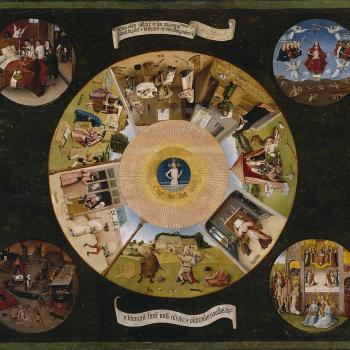Gandalf and the apostle Paul shed light on the smoke and mirrors of religion and politics. Who’s blowing smoke in your life?

In The Two Towers, Gandalf the Grey visits Theoden, king of Rohan. Much to his dismay, the good wizard discovers his friend possessed by the evil wizard Saruman who seeks to control him. Saruman’s lackey, Grima Wormtongue, has become the king’s advisor, whispering deceptions into his ear, and manipulating every decision he makes. Gandalf frees Theoden from Saruman’s spell, and the king can breathe the free air again. Gandalf confronts Wormtongue, takes control, and casts him out. Once more, Theoden can lead his people, defend them, and live in honor.
Sergius Paulus Freed
In Acts 13:4-12, Paul and Barnabas have a similar encounter. Instead of a king, it’s a Roman proconsul named Sergius Paulus. In place of a wizard and his lackey, it’s a sorcerer named Elymas. A proconsul is the governor of a Roman province, appointed by the senate for a one-year term. Sergius Paulus must have been successful because evidence shows that he served for three years. We don’t know all about the relationship between the proconsul and the sorcerer, but Elymas served in some sort of advisory capacity, as a religious leader.
In the story, Elymas is determined to keep Sergius Paulus from seeing the truth that could make him lose the considerable power that he had gained in the region. Interestingly, Paul curses him with the same punishment that he had experienced himself—temporary blindness. Just like Gandalf who drew Saruman from Theoden like poison from a wound, Paul and Barnabas exorcise the sorcerer’s control from the proconsul’s life.
We need more Gandalfs, Pauls and Barnabases in leadership today. We spend so much time listening to the Wormtongues and Elymases all around us that we fall victim to their manipulations. Just as the king and proconsul were held captive by deceptive voices, so people of democratic nations often fall prey to the whisperings of those who would mislead people with smoke and mirrors.
Smoke and Mirrors
The term “smoke and mirrors” refers to the practices of illusionists who want you to believe that they have some real kind of power. A puff of smoke distracts you or conceals what is really going on. Mirrors bend light to alter your perception of reality. Mirrors also get you focused on yourself rather than on the thing that matters most. When you’re dazzled by yourself, it’s hard to see what’s going on next to you.
Today’s charlatans employ the same tricks of the trade. Biased Fox News blows smoke whenever it wants to distract your attention, and wherever it wants to distort and cover up the truth. Politicians use mirrors to get you to focus on yourself, your issues, your needs, and your own special interest group. Then, individuals get caught up in all the smoke and mirrors and become sorcerers of their own, regurgitating whatever they’ve heard others say, and adding their own hatred, intolerance, and prejudice to the mix.
Social media is plastered with smoke and mirrors. And for those who are less technological, car bumpers serve the same purpose. We become part of the propaganda machine for whatever cause we mindlessly support. Oh, how we need Gandalf, Paul, and Barnabas! Oh, how we need Actual Jesus to set us free from the spin doctors of our society!
A Decade Ago…
I remember when I was pastoring a congregation a decade ago when the US Supreme Court legalized gay marriage in all fifty states. That raised an outrage among Evangelicals! I got in trouble for telling my Baptist congregation, “It’s a done deal, whether you voted for it or not. To continue the fight and complain is to waste valuable energy at best. At worst, your arguments employ smoke-and-mirrors tactics to divert attention from the fact that Evangelicals have the worst divorce rates in the nation, with our own Baptist denomination leading the pack! Instead of conveniently pointing our fingers at others and shouting about those evil sinners who are violating biblical marriage, we ought to quit using smoke and mirrors to distract ourselves from the fact that we need to be taking a good look at ourselves.” You wouldn’t believe how mad they were to hear that!
The More Things Change…
Time has passed, and I am (thankfully) no longer in the pulpit. But the more things change, the more they stay the same. White Evangelicals continue their outrage over issues peripheral to the gospel that they say they’re all about spreading. Here are just eight Evangelical hot-button topics today:
- Southern Baptists and Christian & Missionary Alliance argue whether women should be allowed to preach.
- United Methodists split over LGBTQIA+ inclusion.
- Zionist Christians support Israel’s occupation of Gaza, while hypocritically denouncing Russia’s occupation of Ukraine. (Why can’t they see they’re the same thing?)
- The US Supreme Court overturns Roe v. Wade, allowing conservative states to impose Evangelical values on their citizens.
- Conservatives threaten IVF (In Vitro Fertilization), abortion pills, and contraception.
- Conservative churches continue to find themselves embroiled in abuse allegations.
- Christians in Louisiana government believe they can make their state great again by installing the Ten Commandments in every classroom.
- MAGA Christians continue their blind support of a convicted felon, drawing a false equivalency between Trump and Jesus.
Each of these issues employs smoke and mirrors to keep Evangelicals from focusing on the one thing they say is important to them—evangelism. While I have my own thoughts about proselytization, I am struck by how each of the above issues distracts Evangelicals from what they say is their main purpose—sharing the love of Jesus.
I Came into the World for Judgment
In John 9:39, Jesus says, “I came into this world for judgment, so that those who do not see may see and those who do see may become blind.” We must remember that it is for judgment that JESUS came into the world—not for judgment that WE are in the world. And the judgment for which Jesus came into the world isn’t the type we imagine. In John 8:15, Jesus says, “You judge by human standards; I judge no one.” Jesus didn’t come into the world to condemn the world, but through him, the world might be saved (John 3:17). So, Jesus didn’t come to judge. He came so that we might learn from him and likewise practice sound judgment.
Who’s Blowing Smoke in My Life?
As you practice Christlike judgment in your own life (not the lives of others), ask yourself, “Who’s blowing smoke in my life?” Who are the Sarumans and Wormtongues who have you enthralled to their power? Which candidate, news source, or social media outlet has you hooked? Who’s the Elymas in your news feed? Who’s gotten you so angry by their social media post that you can’t stop doom scrolling? Is there someone telling you that most of the media is “fake news?” Are there politicians telling you that anything that goes against them must have been rigged? Who is the sorcerer keeping Evangelicals distracted from their main purpose? It’s time for an exorcism, so you can breathe the free air.
For related reading, check out my other articles:
- Emergency Brakes at Highway Speeds (& Other Cries for Help)
- Peacemaking: Looking Them in the Eye of Their Personal Storm
- Stop Dehumanizing and Demonizing Your Enemies!


















